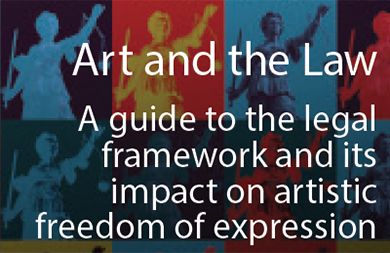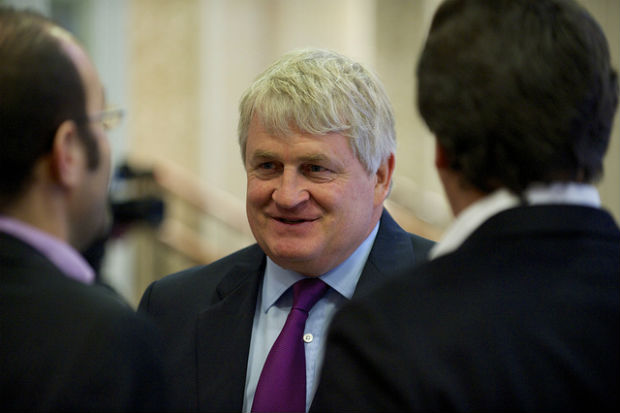19 Aug 15 | mobile, Netherlands, News and features, Youth Board
This is the sixth of a series of posts written by members of Index on Censorship’s youth advisory board.
Members of the board were asked to write a blog discussing one free speech issue in their country. The resulting posts exhibit a range of challenges to freedom of expression globally, from UK crackdowns on speakers in universities, to Indian criminal defamation law, to the South African Film Board’s newly published guidelines.
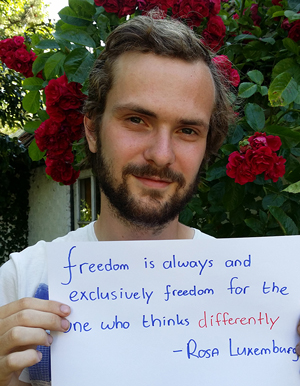
Ravian Ruys is a member of the Index youth advisory board. Learn more
“Haat imam” is a man whose life solely depends on the complete destruction of western values and interests, or so one would think if you were reading or watching the Dutch media.
It is a word used whenever we are talking of an imam whose views are considered either too conservative or too radical. In most cases, when someone is labelled a haat imam, they are subject to protest or no-platforming. In 2015, there have been three known cases of events being cancelled because some of the speakers were labelled haat imams. In these incidences, the individuals involved were investigated by Dutch security services and considered safe, meaning they were found to have no known links to terrorist organisations.
All this has led the Volkspartij voor Vrijheid en Democratie (People’s Party for Freedom and Democracy), a political party currently in power, to advocate a blacklist for radical preachers. The party warns that this blacklist should not only include those Muslim preachers who have known links to terrorist organisations, but also those who spread hate.
This means public pressure leads to the narrowing of freedom of speech for one specific group of people. It has also created a feeling of persecution surrounding young Muslims, made even worse by the deputy prime minister quoting flawed scientific research stating that 80 per cent of young Dutch-Turks support ISIS.
If you are a Muslim in the Netherlands, you are now in an environment where you feel you must be the nicest Muslim anyone has ever met or you can’t be trusted. Perversely, this lack of trust is often quoted as one of the things that drives young Muslim men and women into the arms of extremist organisations. Consequently, a policy trying to protect us against extremist propaganda works in favour of the extremists.
The Netherlands has a great reputation when it comes to freedom of speech and we should keep it that way. This means creating a fair and equal space for Muslims in our country to debate their religion on their terms. We might not always like what we hear, but we cannot intervene directly unless a direct threat is made against innocents. If we do not trust those involved, in other words, if we do not trust our fellow countrymen, how can we expect their trust in return?
Without trust, politics and civil society become a bloody mess.
Ravian Ruys, The Netherlands
Related:
• Muira McCammon: GiTMO’s linguistic isolation
• Jade Jackman: An act against knowledge and thought
• Harsh Ghildiyal: Defamation is not a crime
• Tom Carter: No-platforming Nigel
• Matthew Brown: Spying on NGOs a step too far
• About the Index on Censorship youth advisory board
• Facebook discussion: no-platforming of speakers at universities
18 Aug 15 | Academic Freedom, Magazine, mobile, Student Reading Lists
Much of Index on Censorship’s global work involves allowing censored journalists an outlet to publish articles which may be unpublished in their home countries. This reading list, focusing on journalism, looks at issues surrounding freedom of expression and press freedom. It includes articles from Professor Emily Bell on the tools moving journalism forward and Professor Richard Sambrook’s reflection on the murders of journalists around the world that go unnoticed.
Students and academics can browse the Index magazine archive in thousands of university libraries via Sage Journals.
Journalism and censorship articles
Explosion of independent journalism by Stefan Bratkowski
Stefan Bratkowski, April 1987; vol. 16, 4: pp. 17-18
A message from Warsaw to the London censorship conference from a dissident
Back to the future by Iona Craig
Iona Craig, September 2014; vol. 43 , 3: pp. 8-12
Award-winning foreign correspondent Iona Craig discusses the growing need for journalist in war zones to go back to old ways of ignoring surveillance
The spirit of journalism by Ocak Isik Yurtcu
Ocak Isik Yurtcu, March 1997; vol. 26, 2: pp. 99-103
An imprisoned Turkish journalist, serving 15 years for anti-terror charges, discusses his experiences
Generation Why by Ian Hargreaves
In Index’s special report on the future of journalism, Ian Hargreaves considers whether the next generation of journalists will work with the public to hold the powerful to account
Users + Tools = Journalism by Emily Bell
Emily Bell, November 2007; vol. 36, 4: pp. 100-104
The Guardian’s Emily Bell on how technology is shaping the future of news and what editors need to do to adapt
Print Running by Will Gore
Will Gore, September 2014; vol. 43, 3: pp. 51-54
Another one from the special report on journalism, The Independent’s Will Gore looks at journalistic innovation
Re-writing the future: five young journalists from around the world by Ahlam Mohsen, Katharina Frick, Luca Rovinalti, Athandiwe Saba and Bhanuj Kappal
Ahlam Mohsen, Katharina Frick, Luca Rovinalti, Athandiwe Saba, Bhanuj Kappal, September 2014; vol. 43, 3: pp. 18-19
Five young journalists, from Yemen, South Africa, Germany, India and the Czech Republic, share their hopes for the profession
In quest of journalism by Jay Rosen
Jay Rosen, May 1997; vol. 26, 3: pp. 81-89
Michael Foley interviews New York University’s professor of journalism, Jay Rosen
Attack on ambition by Dina Meza
Dina Meza, September 2014; vol. 43, 3: pp. 30-33
Human rights campaigner and Index on Censorship Freedom of Expression Award’s nominee Dina Meza talks about the situation in Honduras where young journalists are entering a profession rife with corruption and fear
Journalists are dying every day by Richard Sambrook
Richard Sambrook, March 2015; vol. 44, 1: pp. 101-102
Professor Richard Sambrook delivers a morbid account of how the deaths of journalists around the world are going unnoticed
The reading list for journalism and censorship can be found here
18 Aug 15 | Academic Freedom, mobile, News and features, United Kingdom, Youth Board
This is the fourth of a series of posts written by members of Index on Censorship’s youth advisory board.
Members of the board were asked to write a blog discussing one free speech issue in their country. The resulting posts exhibit a range of challenges to freedom of expression globally, from UK crackdowns on speakers in universities, to Indian criminal defamation law, to the South African Film Board’s newly published guidelines.
On 12 February 2015, the Counter-Terrorism and Security Act became law in the UK. If the fact that it is the seventh counter-terrorism bill in 14 years wasn’t enough to demonstrate the creep of governmental control, part five of the new legislation poses a direct and disturbing threat not just to freedom of expression but to knowledge and thought as well.
Part five of the Counter-Terrorism and Security Act places a statutory duty on public authorities to prevent terrorism. Under this remit falls schools and universities; places that used to be woven with the notion of free thought. The directions contained in the statute are unclear and gives universities the right to ban, exclude and prevent discussions that certain officials deem to incite radicalisation.
However, freedom of academic thought or discussion is not even the sole concern. London School of Economics Student Union’s community and welfare officer Aysha said: “Students who go to support services will now not be entitled to confidentiality under the new act if that person is deemed a ‘threat’, which is incredibly racialised.” In short, there is the potential that students would be unable to voice personal concerns, or the need for support, due to stereotypes that this act will enforce.
Jade Jackman, UK
Related:
• Harsh Ghildiyal: Defamation is not a crime
• Tom Carter: No-platforming Nigel
• Matthew Brown: Spying on NGOs a step too far
• About the Index on Censorship youth advisory board
• Facebook discussion: no-platforming of speakers at universities
18 Aug 15 | India, mobile, News and features, Youth Board
This is the third of a series of posts written by members of Index on Censorship’s youth advisory board.
Members of the board were asked to write a blog discussing one free speech issue in their country. The resulting posts exhibit a range of challenges to freedom of expression globally, from UK crackdowns on speakers in universities, to Indian criminal defamation law, to the South African Film Board’s newly published guidelines.
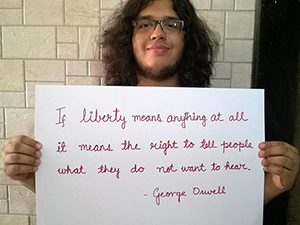
Harsh Ghildiyal is a member of the Index youth advisory board. Learn more
Sections 499 and 500 of the Indian Penal Code, 1860, which criminalise defamation, have been challenged before the Supreme Court of India. In addition, sections of the Code of Criminal Procedure, 1973, which provide the procedure for prosecution, have been challenged.
Over the years, through several cases, the Supreme Court has made it clear that restrictions in place on speech must be reasonable, and only to the extent that they are necessary. Defamation is expressly listed as one of these reasonable restrictions but criminal defamation is not in the least bit reasonable. If the restriction goes beyond the intended purpose, it must be struck down.
Criminal defamation cases have been filed against the media, politicians and individuals for their statements. While adequate remedies for defamation exist under civil law, the provision criminalising defamation provides for imprisonment of up to two years, a fine or both. The punishment is disproportionate to an act which doesn’t go against society but against individuals.
More often than not used for dampening legitimate criticism rather than actually serving its purpose, criminal defamation is clearly not a reasonable restriction and can act as an impediment to free speech.
Harsh Ghildiyal, India
Related:
• Jade Jackman: An act against knowledge and thought
• Tom Carter: No-platforming Nigel
• Matthew Brown: Spying on NGOs a step too far
• About the Index on Censorship youth advisory board
• Facebook discussion: no-platforming of speakers at universities
17 Aug 15 | Bahrain, Bahrain Letters, Campaigns
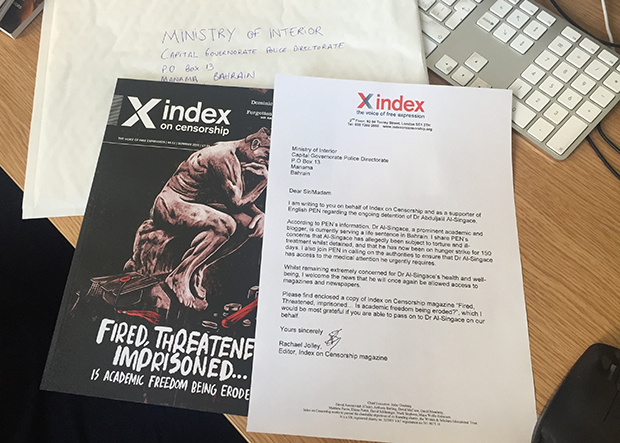
Today marks the 150th day of prominent Bahraini academic and blogger Dr. Abduljalil Al-Singace’s hunger strike.
Al-Singace is protesting prison conditions in Bahrain. He is currently being held in solitary confinement at Al Qalaa hospital due to his poor health, and is reportedly being denied access to the full medical assistance he requires. Al-Singace, who has been promoting human rights in Bahrain since 2000, is serving a life sentence for allegedly plotting to overthrow the government.
Index’s magazine editor, Rachael Jolley, responded to a call by English Pen to send a magazine for Abduljalil Al-Singace along with a copy of the letter below via the Ministry of Information.
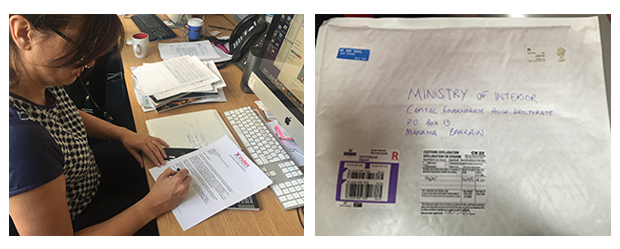
You too can express your support for Al-Singace by signing the petition asking for the immediate and unconditional release of Al-Singace and of all those detained in Bahrain in violation of their right to freedom of expression.
You can also join the social media campaign for Al-Singace by sharing details of his case with your friends and contacts using #SingaceHungerStrike.
Letter to the Ministry of Interior
Ministry of Interior
Capital Governorate Police Directorate
P.O Box 13
Manama
Bahrain
Dear Sir/Madam
I am writing to you on behalf of Index on Censorship and as a supporter of English PEN regarding the ongoing detention of Dr Abduljalil Al-Singace.
According to PEN’s information, Dr Al-Singace, a prominent academic and blogger, is currently serving a life sentence in Bahrain. I share PEN’s concerns that Al-Singace has allegedly been subject to torture and ill-treatment whilst detained, and that he has now been on hunger strike for 150 days. I also join PEN in calling on the authorities to ensure that Dr Al-Singace has access to the medical attention he urgently requires.
Whilst remaining extremely concerned for Dr Al-Singace’s health and well-being, I welcome the news that he will once again be allowed access to magazines and newspapers.
Please find enclosed a copy of Index on Censorship magazine “Fired, threatened, imprisoned… Is academic freedom being eroded?”, which I would be most grateful if you are able to pass on to Dr. Al-Singace on our behalf.
Yours sincerely
Rachael Jolley,
Editor, Index on Censorship magazine
17 Aug 15 | mobile, News and features, United Kingdom, Youth Board
This is the second of a series of posts written by members of Index on Censorship’s youth advisory board.
Members of the board were asked to write a blog discussing one free speech issue in their country. The resulting posts exhibit a range of challenges to freedom of expression globally, from UK crackdowns on speakers in universities, to Indian criminal defamation law, to the South African Film Board’s newly published guidelines.
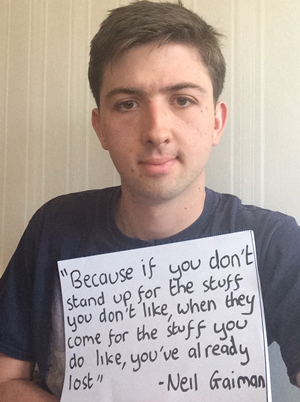
Tom Carter is a member of the Index youth advisory board. Learn more
Universities are meant to be institutions that embody the spirit of free expression. They are places where new ideas are formulated and environments where students are exposed to a range of viewpoints. However, whilst freedom of expression in universities is under threat from government intervention, another threat to freedom of expression on UK campuses is originating from the students themselves.
In October 2014, UKIP’s Nigel Farage was invited by the University of Cambridge’s politics department to give an address on an undisclosed topic. This prompted two independent Facebook campaigns, one of which was from the Cambridge University Students’ Union Women’s Campaign imploring Cambridge to rescind the invitation, which it eventually was.
This is indicative of an increasing hostility among UK students towards the expression of ideas deemed unacceptable. Whether or not you agree or disagree with UKIP’s policies, they are the UK’s third largest party by vote share and very much constitute part of the political mainstream.
The fact that students are now willing to influence the speaker choices of universities is a worrying trend. Only by hearing views different to your own can your ideas be refined and fine-tuned and hearing policies expressed in public discussion is the only way to scrutinise them effectively.
Tom Carter, UK
Related:
• Matthew Brown: Spying on NGOs a step too far
• About the Index on Censorship youth advisory board
• Facebook discussion: no-platforming of speakers at universities
17 Aug 15 | mobile, News and features, United Kingdom, Youth Board
The new cohort of the Index on Censorship youth advisory board was launched last month. The board is already participating in discussions on Facebook.
Members of the board were asked to write a blog discussing one free speech issue in their country. The resulting posts exhibit a range of challenges to freedom of expression globally, from UK crackdowns on speakers in universities, to Indian criminal defamation law, to the South African Film Board’s newly published guidelines.
In the first of a series of posts, youth board member Matthew Brown explores mass surveillance in the UK.
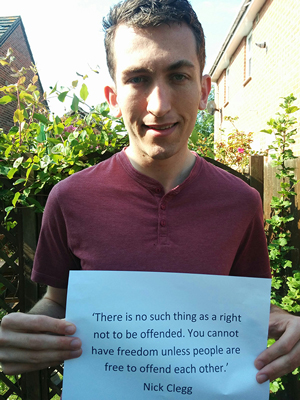
Matthew Brown is a member of the Index youth advisory board. Learn more.
I don’t often begin writing by quoting Herman Goering but on one account he was worryingly accurate. Goering stated that: “The people can always be brought to the bidding of the leaders. All you have to do is tell them they are being attacked and denounce the pacifists for lack of patriotism and exposing the country to danger. It works the same way in any country.”
Increasing levels of surveillance are often justified as essential in protecting us from imminent attack but the recent revelation that GCHQ spied illegally on Amnesty International, an organisation relying upon the secrecy of their communications with human rights defenders, demonstrates the extent to which state surveillance methods are now out of control.
It is easy to scorn states known for their dictatorial regimes but our society has only progressed to its current position through holding the state to account. If we fail to continue to do so, then the slide towards a world in which freedom of expression is restricted at any given moment the government decides appropriate is inevitable. The interception of the correspondence of NGOs raises the worrying question of how these organisations can continue their crucial work if their confidential correspondence is likely to end up out of their hands.
Matthew Brown, UK
Related:
• Tom Carter: No-platforming Nigel
• About the Index on Censorship youth advisory board
• Facebook discussion: no-platforming of speakers at universities
17 Aug 15 | Campaigns, Statements
The following letter was published in The Times.
Sir, The abrupt cancellation of the National Youth Theatre’s production of Homegrown is a troubling moment for British theatre and freedom of expression. The play seeks to examine radicalisation and disaffection among British youth. Its cancellation serves only to shut down conversation on these important issues. We fear that government policy in response to extremism may be creating a culture of caution in the arts.
We are deeply concerned by reports that the NYT may have been put under external pressure to change the location and then cancel the production. Police, local authorities and arts organisations have a duty to respect and protect freedom of expression — even, and most especially, where they disagree with the message or find it controversial.We urge the NYT to give a full account of what led to the decision, and hope that a way can be found to stage it so that the young voices involved can be heard and the production can be judged on its merits.
Maureen Freely, president, English PEN
David Aaronovitch, chair, Index on Censorship
Jodie Ginsberg, chief executive, Index on Censorship
Jo Glanville, director, English PEN
Shami Chakrabarti, director, Liberty
Anish Kapoor, artist
Anneliese Davidsen, executive director, Unicorn Theatre
Christopher Haydon, artistic director, Gate Theatre
Sir David Hare, playwright
David Lan, artistic director, Young Vic
Gurpreet Kaur Bhatti, playwright
Heydon Prowse, actor
Jolyon Rubinstein, actor
Howard Brenton, playwright
Josie Rourke, artistic director, Donmar Warehouse
Lorne Campbell, artistic director, Northern Stage
Monica Ali, writer
Timberlake Wertenbake, playwright
Nell Leyshon, playwright
Nick Williams, executive director, Actors Touring Company
Ramin Gray, artistic director, Actors Touring Company
Sabrina Mahfouz, playwright
Sarah Frankcom, artistic director, Royal Exchange Theatre Manchester
Simon Callow, actor
Stella Odunlami, artist and performer
Related:
• The Times: Why was Homegrown cancelled?
• Index calls for transparency on Homegrown cancellation (13 August 2015)
• Creative team behind Homegrown “deeply shocked” by cancellation (13 August 2015)
• Cancellation of Homegrown is very worrying (5 August 2015)
14 Aug 15 | Events, mobile, Zimbabwe

The Bafta-winning duo Heydon Prowse and Jolyon Rubinstein, of BBC Three’s comedy series The Revolution Will Be Televised are joining their award-winning Zimbabwean counterparts Zambezi News for a very special one-off show at The Comedy Café Theatre, London.
Featuring Zambezi News Live – a 30 minute satirical sketch performance from Comrade Fatso, Outspoken and Michael K that hilariously tackles issues from race to sex, politics to sport and hip-hop to land reform. The story of Zambezi News, the comedians poking fun at power in Zimbabwe, was covered in the latest issue of Index on Censorship magazine.
The Zimbabweans will then be joined onstage by Heydon and Jolyon to share stories, swap jokes and explore experiences of censorship and free speech on both sides of the Sahara.
When: Thursday 27th August, 8.00pm
Where: The Comedy Cafe, 68 Rivington St, Shoreditch, London, SE2 (Map/directions)
Tickets: Sold out

Presented in partnership with The Comedy Cafe Theatre
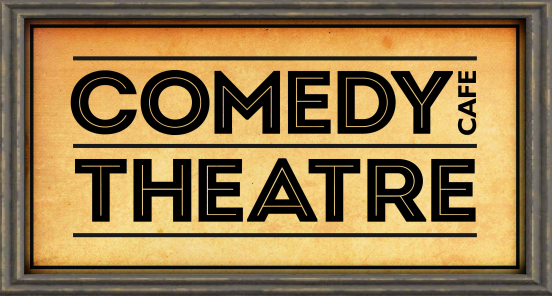
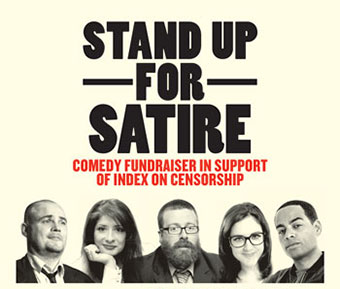 Index on Censorship has been publishing articles on satire by writers across the globe throughout its 43-year history. Ahead of our event, Stand Up for Satire, we published a series of archival posts from the magazine on satire and its connection with freedom of expression.
Index on Censorship has been publishing articles on satire by writers across the globe throughout its 43-year history. Ahead of our event, Stand Up for Satire, we published a series of archival posts from the magazine on satire and its connection with freedom of expression.
14 July: The power of satirical comedy in Zimbabwe by Samm Farai Monro | 17 July: How to Win Friends and Influence an Election by Rowan Atkinson | 21 July: Comfort Zones by Scott Capurro | 24 July: They shoot comedians by Jamie Garzon | 28 July: Comedy is everywhere by Milan Kundera | Student reading lists: Comedy and censorship
14 Aug 15 | Azerbaijan, Azerbaijan Statements, Campaigns, mobile, Statements
The Sport for Rights coalition condemns the conviction and harsh sentencing of Azerbaijani human rights defenders Leyla and Arif Yunus on 13 August by the Baku Court of Grave Crimes. After a trial marred by irregularities and due process violations, the court convicted the couple on politically motivated charges including illegal entrepreneurship, tax evasion, and fraud, and sentenced Leyla to 8.5 years in jail, and Arif to seven.
“These sentences are outrageous, and aimed purely at sanctioning the legitimate work of these two Azerbaijani human rights defenders. While the heavy sentences are no surprise, they serve to further undermine Azerbaijan’s complete disregard for the international standards of fair trial and due process”, said Souhayr Belhassen, FIDH Honorary President.
“The unprecedented speed with which the Yunus trial was carried out is appalling and tells us a lot about its quality. The judgment is full of inaccuracies due to a total lack of examination of the evidence provided. Violations of international standards of the right to a fair trial were obvious”, declared Gerald Staberock, Secretary General of OMCT.
Leyla, the Director of the Institute for Peace and Democracy, and Arif, a historian and activist in his own right, were arrested in July and August 2014, following Leyla’s public calls for a boycott of the inaugural European Games, which were held in Baku in June 2015. Sport for Rights considered them ‘Prisoners of the Games. Leyla had also been working to compile a detailed list of cases of political prisoners, and was a strong advocate of fundamental freedoms, property rights, and peaceful resolution of the Nagorno-Karabakh conflict.
The couple have been held in separate facilities; Leyla in the Kurdakhani investigative detention unit, and Arif at the Ministry of National Security’s investigative prison. Leyla reported being mistreated on several occasions, and Arif reported poor conditions. Both Leyla and Arif suffer from serious health problems, which have sharply deteriorated in detention, and have caused delays during trial proceedings, including on the day of the verdict, when Arif fainted and was attended to by a doctor. Nonetheless, the authorities resisted calls for their release on humanitarian grounds, and the court rushed to issue a verdict.
“The health situation of Leyla and Arif Yunus is extremely worrying and deserves the highest attention of the international community. Whilst we are thankful for the international attention brought to the case by some voices, we remain concerned by the lack of action of the Council of Europe and the European Union. It is clear that the climate of fear has reached a new low with these sentences and the killing of journalist Rasim Aliyev”,said Ane Tusvik Bonde, Regional Manager for Eastern Europe and Caucasus of the Human Rights House Foundation (HRHF).
The Yunus’ conviction takes place amidst a broader human rights crackdown in Azerbaijan, in the aftermath of the European Games and the run-up to November’s parliamentary elections. The same week as the verdict in the Yunus’ case, journalist Khadija Ismayilova also stood trial, facing serious jail time on politically motivated charges, and Rasim Aliyev, journalist and Chairman of the Institute for Reporters’ Freedom and Safety, died in hospital after being severely beaten. With less than three months until the parliamentary elections, the Azerbaijani authorities seem determined to continue working aggressively to silence the few critical voices left in the country.
The Sport for Rights coalition reiterates its call for the immediate and unconditional release of Leyla and Arif Yunus, as well as the other jailed journalists and human rights defenders in Azerbaijan. Sport for Rights further calls for sustained international attention to the country and increased efforts to hold the Azerbaijani regime responsible for its human rights obligations in the pre-election environment and beyond.
Supporting organisations:
ARTICLE 19
Canadian Journalists for Free Expression
Civil Rights Defenders
Freedom Now
Front Line Defenders
Human Rights House Foundation
Index on Censorship
International Federation for Human Rights (FIDH), within the framework of the Observatory for the Protection of Human Rights Defenders
Norwegian Helsinki Committee
PEN American Centre
Platform
Solidarity with Belarus Information Office
World Organisation Against Torture (OMCT), within the framework of the Observatory for the Protection of Human Rights Defenders
[smartslider2 slider=”35″]
[timeline src=”https://docs.google.com/spreadsheets/d/1_rMZeC8deu7lQgoJPEESF0IqNO9u7aVuESqWMualEJw/pubhtml” width=”620″ height=”600″ font=”Bevan-PotanoSans” maptype=”toner” lang=”en” ]
14 Aug 15 | Ireland, mobile, News and features
Denis O’Brien, Ireland’s richest media mogul and owner of the country’s largest newspaper group, had a satire malfunction last week when his solicitors, Meaghers, pursued up-and-coming satirical website Waterford Whispers.
The site, known as WWN, had published a fictional story about a parallel universe in which the tycoon had been convicted of white collar crime. The editors soon received a letter stating that “references to a ‘parallel universe’ are a sham”, and that the lawyers had instructions to take “all necessary steps to vindicate their client’s good name and reputation.”
Scary stuff for a fledgling operation. Editor Colm Williamson, faced with the wrath of O’Brien, understandably took the post down.
Then, political site Broadsheet.ie reported the threat to Waterford Whispers, including a screengrab of the original article. So, they, too, got a letter from Meaghers, as did their web hosting company, hostingireland.ie.
For all that, it would be wrong to characterise this as simply a rich and powerful man going after innocent upstart startups. That would be to denigrate O’Brien unfairly. For he is equally at home pursuing the parliament and the national broadcaster as he is pursuing people who write jokes.
As previously reported by this column, O’Brien took umbrage when an independent TD, Catherine Murphy, raised allegations over his business finances in the chamber of the Dáil. O’Brien got an injunction against RTE, the state broadcaster, from reporting the comments, in spite of the fact that, as Murphy enjoyed parliamentary privilege, her comments were available on the Oireachtas (parliament) website.
The Dáil’s Committee on Procedure and Privileges subsequently found that Murphy had not abused her parliamentary privilege, and that it could not rule on the veracity of her comments.
It emerged earlier this month that O’Brien is taking legal action against the committee protesting that decision. He is also taking legal action against the state: He is suing the country over comments made in parliament. Where the hell does satire go from here?
The answer is that satire has never had the most comfortable existence in Ireland, in spite of all our Swifts and Wildes and Becketts and O’Briens.
While we may be a people noted for our sense of humour, we’re deadly serious when it comes to ourselves. O’Brien, a man richer than Oprah, or Donald Trump for that matter, portrays himself throughout these proceedings as the innocent assailed on all sides. He is a citizen making a stand for all that is good and holy in a wicked world.
He, a decent man, a patriot no less, a man who volunteered to pay the wages of the national football team, is assailed by gombeens, ingrates and begrudgers who will do everything in their power to keep a good man down. These forces may take the form of the state or a small website. It doesn’t matter. What matters is there are external forces trying to destroy us. It’s probably a post-colonial thing. We can usually blame that.
But whatever the psychology behind it, O’Brien has engaged a scattergun assault on free speech. It’s fascinating to watch, as he turns one Waterford Whispers spoof story into a near-prophecy.
“Denis O’Brien To Sue Everyone”, read one Waterford Whispers headline in May of this year. “We’re particularly targeting people who have had negative thoughts about Denis in their head but have never uttered them in a public forum,” a fake solicitor was fictitiously quoted as saying in the entirely made up story.
And now? Well we haven’t reached that stage yet, but being honest, one does think twice about writing about Denis O’Brien. And this is only vague trepidation about covering publicly known libel threats. One wonders if editors on struggling titles will really have the stomach for sending a hack out to do some serious muckraking. That is not to suggest that anything will be found — simply that you don’t know until you look. That’s how journalism works.
That O’Brien makes a large part of his money from newspapers, radio and mobile phone communications bears repeating. The free exchange of information is his business. Perhaps he should show a little more respect to the principle and the practice.
This column was posted on 14 August 2015 at indexoncensorship.org
13 Aug 15 | mobile, News and features, United Kingdom
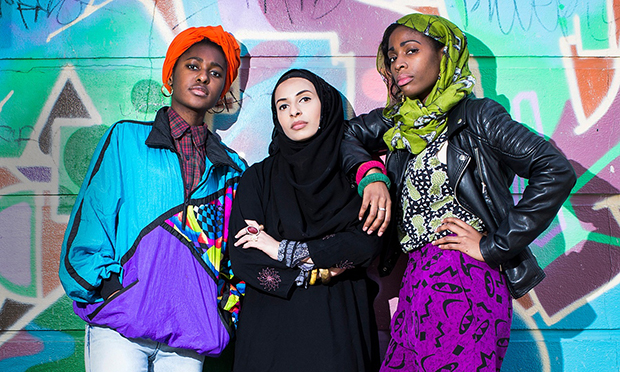
The 112 young cast members were two weeks into rehearsals when the production was cancelled. (Photo: Helen Maybanks / National Youth Theatre)
The following is a statement issued by the creative team behind the cancelled production Homegrown.
We were deeply shocked to find out in an email from the Artistic Director of NYT, Mr Paul Roseby, that the company had decided to cancel the production of Homegrown 10 days before the first preview. We have since been left disappointed and baffled that every subsequent attempt to meet with the NYT – including a meeting planned for Tuesday 11 August – has been either postponed or cancelled.
Homegrown was intended to be a site-specific theatrical exploration of radicalisation, the stories and communities behind the headlines and the perceptions and realities of Islam and Muslim communities in Britain today. The creative team and our cast of 112 young people were two weeks into rehearsals, the culmination of a six-month process, when the production was cancelled. There was no warning and no consultation. We feel that the reasons for this production being shut down have not been transparent, openly addressed nor fully addressed.
Not only have we been silenced, but our 112 cast members – who cared passionately about the show, its content and its questions – have had their artistic expression curbed. The following are just some of their words:
“I have no doubt in my mind that Homegrown would have been an incredible and hugely important production, and for those reasons I truly believe that even though it isn’t happening at present it absolutely must be resurrected in the future.”
“The issue of radicalisation and the role Islam plays in our society is one that needs to be addressed. It’s an elephant in the room for the UK that is not being currently explored.”
“I felt like a genuine creative; and with strong guidance we crafted responses to the world around us. Yet in a moment we were taken back to the level of “just kids” who need to be told what’s best and most safe for us, I can’t say how frustrating it is to go from a place of give and take discussion to top-down authoritarianism. It genuinely worries me on behalf of the freedom of speech promised to creatives in this country and I do feel silenced as an artist. The irony being that these are all strands that would have run through Homegrown.”
“To me, Homegrown being pulled was like my vocal chords being cut. It was everything that was needed to be said and everything that I always felt I couldn’t say.”
“I was genuinely thrilled and exhilarated every day as we peeled back yet more layers of the complex and nebulous issues surrounding radicalisation and Islamophobia”
“If you are going to take on a subject matter this sensitive then you have a responsibility to see it through. To a lot of us this was not just some controversial play we wanted to be a part of, it was about social change and awareness and staying ‘awoke’.”
We feel it is imperative, considering the current political climate, to open up and bring awareness to some of the broader issues and the socio-political landscape of radicalisation, homegrown extremism, and even the simple conversation about Islam. We are making art in a particular climate: the climate of PREVENT and CHANNEL – programmes which are creating an environment in which certain forms of questioning, let alone subversion, of the given narrative pertaining to radicalisation or extremism can be closed down.
It felt like battle lines were being drawn when, on the first day of rehearsals of a show that was to be denied its voice, David Cameron gave his strongest statement drawing links between non-violent extremism and jihadism. As artists we find it unseemly that we are having to defend our work in this manner but, also as artists, we would defend the irreducible right of all artists to make art.
We are keen to turn this into a positive galvanising moment and start a dialogue around these long-standing questions, and are reaching out to artists, institutions and individuals across a spectrum of industries to support us in opening up the conversation we had hoped to initiate with Homegrown.








